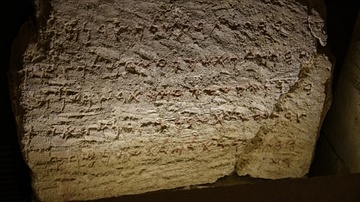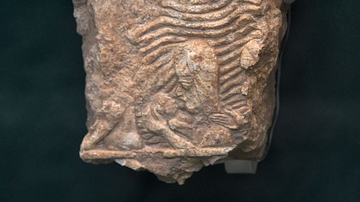Search
Search Results

Image
Phoenician Ship in a Storm
Artist's rendition of a Phoenician ship at sea during a storm. The Phoenicians were a great maritime people and often adorned their ships with horses' heads to honour Yamm, their god of the sea. Although Yamm could raise the seas to sink...

Image
Phoenician Sailors
Artist's impression of Phoenician seafarers leaving port. The Phoenicians were famous around the Mediterranean for their naval trade, exploration and colonization. Created by Amplitude Studios for the video game Humankind.

Image
Phoenician Foundation Inscription from Sidon
The inscription reads (in Phoenician) "Bodastarte, the son of Eshmunazar, the king of Sidon, has ordered this temple to be built for the god Eshmun". Second half of the sixth century BCE. From the foundation wall of the Eshmun Temple at Sidon...

Image
Fleeing Phoenician Queen
This gypsum fragment shows a Phoenician queen holding a baby, fleeing in a boat from the invading Assyrian army. It was once part of limestone relief at the Throne room I of Sennacherib's palace at Nineveh. From the South-West Palace, Nineveh...

Definition
Dido - Legendary Queen of Tyre
Queen Dido (aka Elissa, from Elisha, or Alashiya, her Phoenician name) was a legendary Queen of Tyre in Phoenicia who was forced to flee the city with a loyal band of followers. Sailing west across the Mediterranean she founded the city of...

Definition
Tyre
Tyre (in modern-day Lebanon) is one of the oldest cities in the world, dating back over 4,000 years, during which it has been inhabited almost continuously. It was one of the most important, and at times the dominant, city of Phoenicia, whose...

Image
Phoenician Trade Network
Map of Phoenicia and its trade routes.

Image
Phoenician-Assyrian Warship
This gypsum wall relief depicts a warship. This ship was built and manned by Phoenicians employed by Sennacherib. It is a bireme, with two rows of oars. Shields are fastened around the superstructure, as on the fortifications of some city...

Definition
Greek Dark Age
The Greek Dark Age (c. 1200 to c. 800 BCE, overlapping with the Iron Age, c. 1200-550 BCE) is the modern-day term for the period in Greek history following the Bronze Age Collapse when the Mycenaean Civilization fell and the Linear B writing...

Definition
Berbers
The Berbers have occupied North Africa, specifically the Maghreb, since the beginning of recorded history and until the Islamic conquests of the 8th century CE constituted the dominant ethnic group in the Saharan region. Modern Berber speakers...